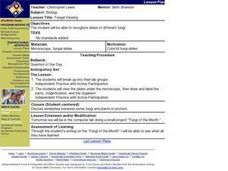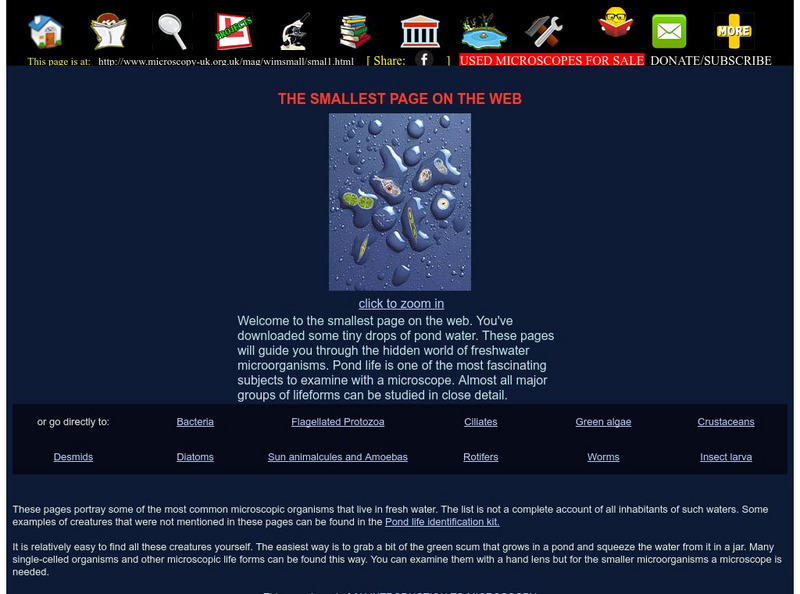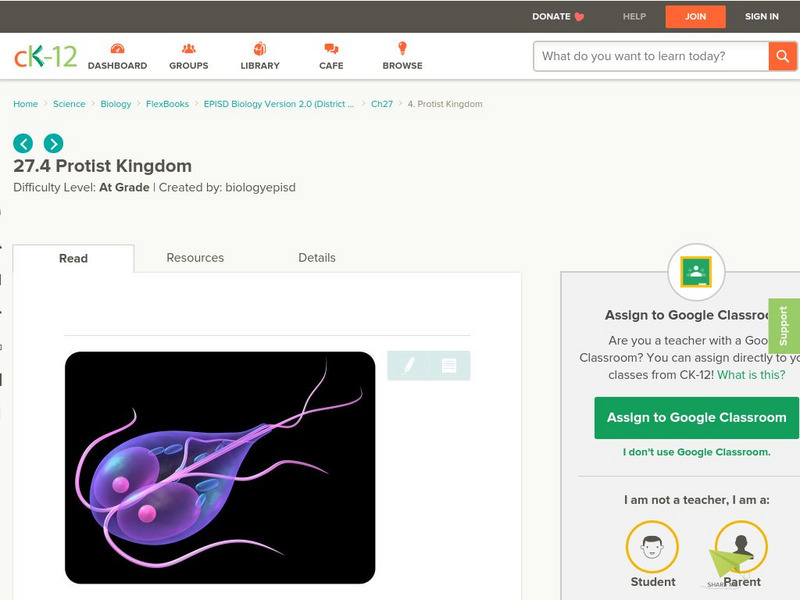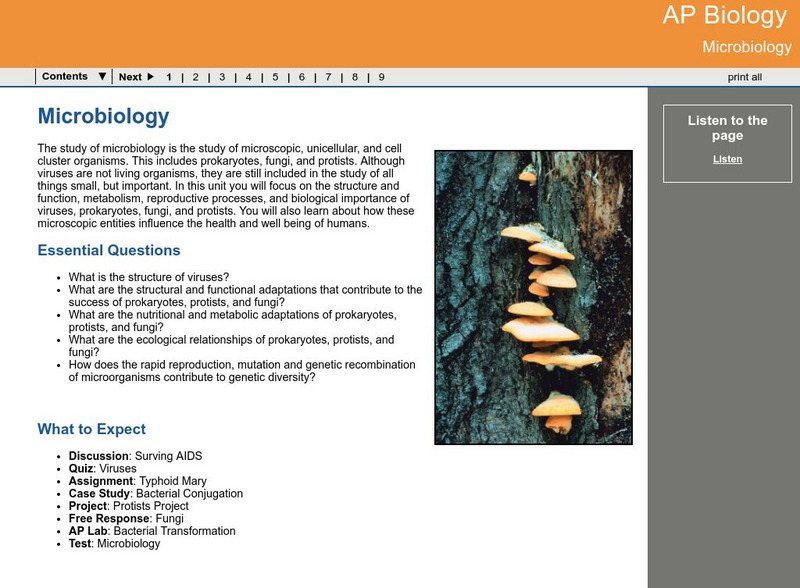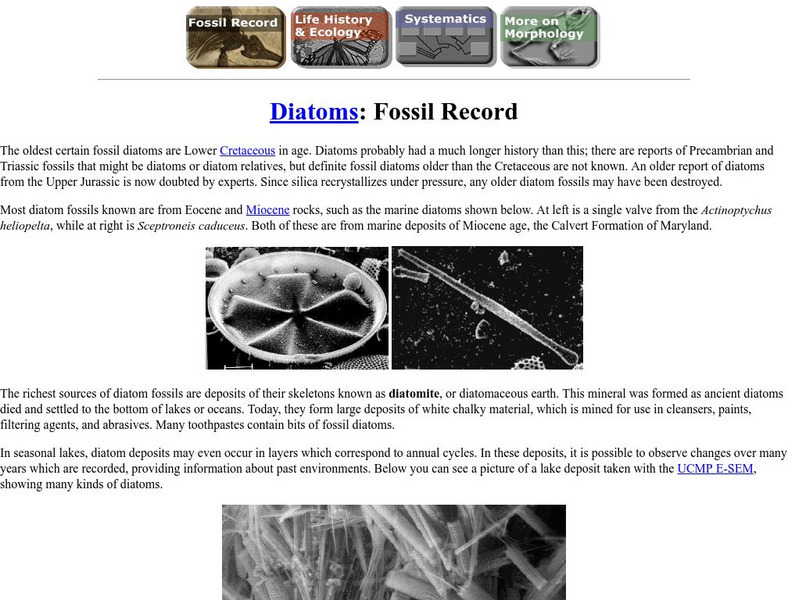Curated OER
Protists - The Protozoans
Five pages provide thorough coverage of three protozoans: euglena, amoebae, and paramecia. For each, junior biologists read factual text, label the organism, and write answers to several questions. This neatly organized assignment is...
Baylor College
The Variety and Roles of Microbes
Mini microbiologists play a card game in which they group microorganisms by groups: virus, fungus, protist, or bacteria. Then they identify the roles different microbes play in the natural world and explore how humans effectively use...
Curated OER
Zooplankton
Holoplankton are always plankton, whereas meroplankton are only plankton as larvae. Reveal several examples of each to your young marine biologists with this PowerPoint presentation. The first seven slides, an introduction to...
Curated OER
Investigative Case - Protistan Tales of Atlantic White Cedar Swamps
Students use this WebQuest to explore the vast diversity of microbes, especially those microbes of the Atlantic Cedar Swamps. They tell a story about the protests of the Atlantic Cedar Swamp in the form of anthropomorphism.
Curated OER
Cells: Structures and Processes
Students explore the basic unit of life, the cell in this nine lessons unit. The cell structure of animal and plant cell functions and how they affect our world are probed in this unit.
Curated OER
Microorganisms
Though there are seventy-seven slides in this PowerPoint, only small bits of information are presented on each. It outlines the roles microorganisms play in the environment and spends time listing characteristics of each four different...
Curated OER
Protist Crossword
In this protist worksheet, students complete a crossword puzzle with 34 questions about the behaviour and different types of protists.
Curated OER
Antigen Switching in Malaria
Students model how the malaria-causing protist avoids immune response in its host. In this parasite biology lesson, students use printed cell images to model the way that Plasmodium changes surface protein markers every few generations...
Curated OER
Diversity of Protists
Students identify under a microscope several different genera of protists. They discuss the three different categories of protists. Students discuss characteristics of the protists that they have already been taught. They view and...
Curated OER
Diseases
Sixth graders create a type of notebook or journal using colored copy paper on which to take notes. They complete research on a certain disease and report on it and then design their own disease causing bacteria or virus. Finally, 6th...
Curated OER
Find the Speed of a Protist
Students identify protists under a microscope, and using a stopwatch calculate the speed of a protist from a pond water sample. They use distance and time to identify the speed of a protist, and create a distance versus time graph to...
Curated OER
Classy
Students explore the classification system in this seven lessons unit. The diversity of life forms and their characteristics are examined using a microscope. Kingdoms, classes, and families are investigated.
Curated OER
Classification of Living Things
In this biology learning exercise, students identify and locate various vocabulary terms relating to the classification of living things. There are 28 biology terms located in the word search.
Curated OER
Fungal Viewing
Young scholars recognize slides of different fungi. They work in lab groups. Students view slides under the microscope, then draw and label the parts, magnification, and the organism. Young scholars discuss similarities between some...
Michigan State University
Michigan State University: Digital Learning Center for Microbial Ecology: Microbe Zoo
Explore the "many worlds of hidden microbes" in different areas of the Microbe Zoo: DirtLand, Animal Pavilion, Snack Bar, Space Adventure, and WaterWorld. A fun and informative resource that sheds light on the role of microbes in our...
University of Michigan
University of Michigan: Great Lakes Diatoms
Major groups of diatoms listed. Also genera list. A comprehensive site on diatoms.
Yale University
Yale Peabody Museum
This home page describes what the museum has to offer. Links to the exhibits and more information is provided at the bottom of the site.
Science Buddies
Science Buddies: Too Much of a Good Thing? Effects of Fertilizer on Algal Growth
Algae is a good thing, but too much is a bad thing. In this environmental science fair project, grow algae in several concentrations of fertilizer and observe its effect on algal growth.
Science Education Resource Center at Carleton College
Serc: Investigative Case: Protistan Tales of Atlantic White Cedar Swamps
A WebQuest where learners explore microbial diversity by looking at the extreme habitat of the Atlantic White Cedar Swamp. Students will learn about protists through personification theme of Aesop's Fables. At the end of the lesson,...
Microscopy UK
Microscopy Uk: The Smallest Page on the Web
Dive into a single drop of pond water to discover the microscopic world of freshwater organisms. Learn about protists, bacteria, and other tiny inhabitants that can only be seen under a microscope.
CK-12 Foundation
Ck 12: Episd: Protist Kingdom
[Free Registration/Login may be required to access all resource tools.] Discover the classified diverse kingdom of protista in this module.
Georgia Department of Education
Ga Virtual Learning: Ap Biology: Microbiology
In this interactive learning module, students focus on the structure and function, metabolism, reproductive processes, and biological importance of viruses, prokaryotes, fungi, and protists.
University of California
Ucmp: Introduction to Slime Molds
This University of California Berkeley site offers a definition of slime molds, structure, and life cycle.
University of California
Ucmp: Diatoms
Fossil records of diatoms. History, ecology, systematics, and morphology.















